
 |
Eager Space | Videos by Alpha | Videos by Date | All Video Text | Support | Community | About |
|---|

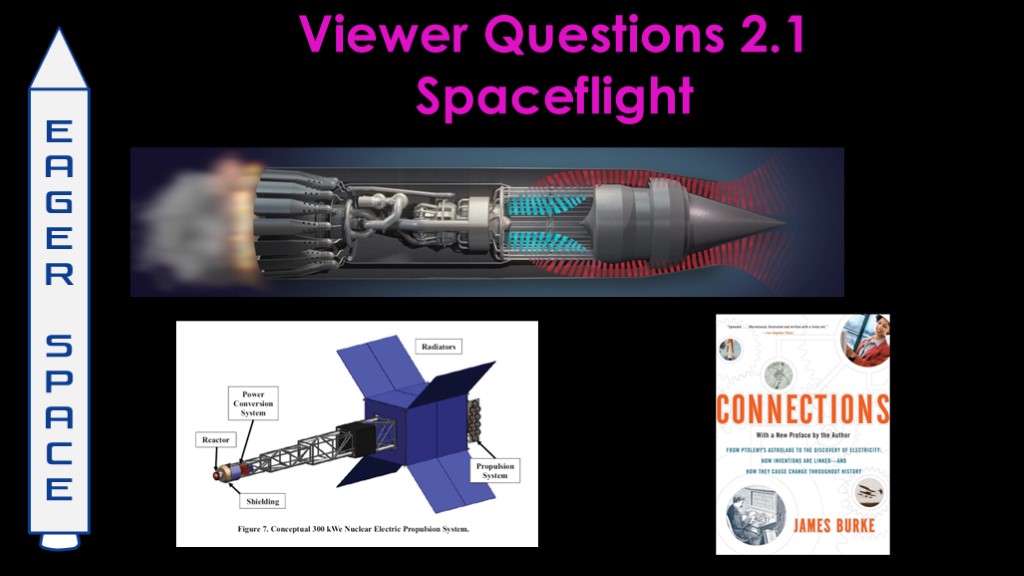
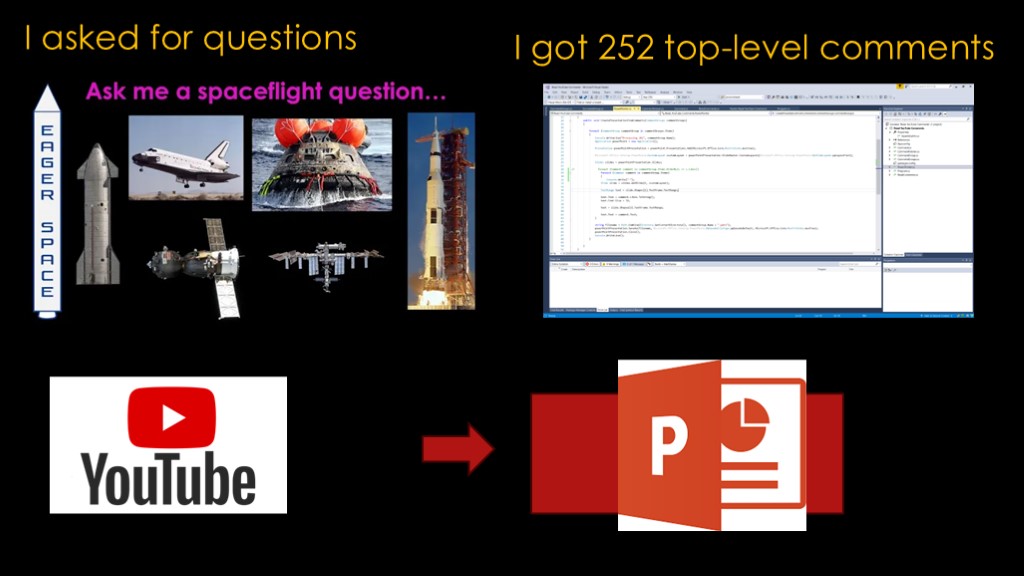
A while back I got the bright idea to ask my viewers for questions that they had about SpaceFlight.
I got 252 top level comments, which was both an opportunity and a problem. How would I deal with so many questions?
The first step was to get them out of YouTube. Nicely - and perhaps surprisingly - YouTube provides a really nice .NET interface.
I opened up Visual Studio, created a C# project, and wrote myself a YouTube comment extractor that would pull out all the top level questions and write them to a CSV file that I could import into Excel.
Then, after about ten minutes of looking at that file, I did two things.
The first was that I broke it into starship and non-starship questions. And I took out the CSV backend and put in a PowerPoint backend, so it would walk through the questions and then create a powerpoint slide for each question.
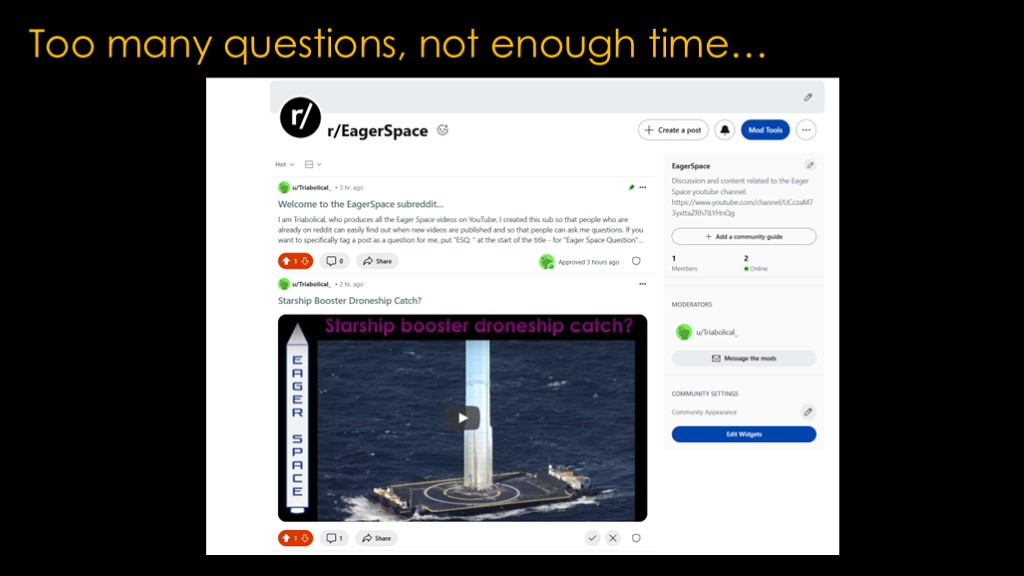
But even with that automation, I can't answer all the questions. Which makes me feel a little bit bad.
In working on some of the answers, I realized that answering them in a video is a lot of work and that inherently means I'm going to choose to answer fewer questions there. I spent 3 or 4 hours looking at cargo shipping cost models to try to understand how much the SpaceX recovery ships cost for the question that became the drone ship video, and that just doesn't scale.
So I came up with an alternative... I created a subreddit on reddit named, not surprisingly, EagerSpace. I will post video links there - at least when I remember - as I currently do on TwiX, but the real point is that I'm more likely to answer questions there because it's cheap and I'm there quite a bit anyway. And other people can answer questions as well.
I should also state that this is the first of a few videos that answer questions, so if your question doesn't show up here, it may show up in a later one. That's why it's labelled as 2.1.
Onto the questions...
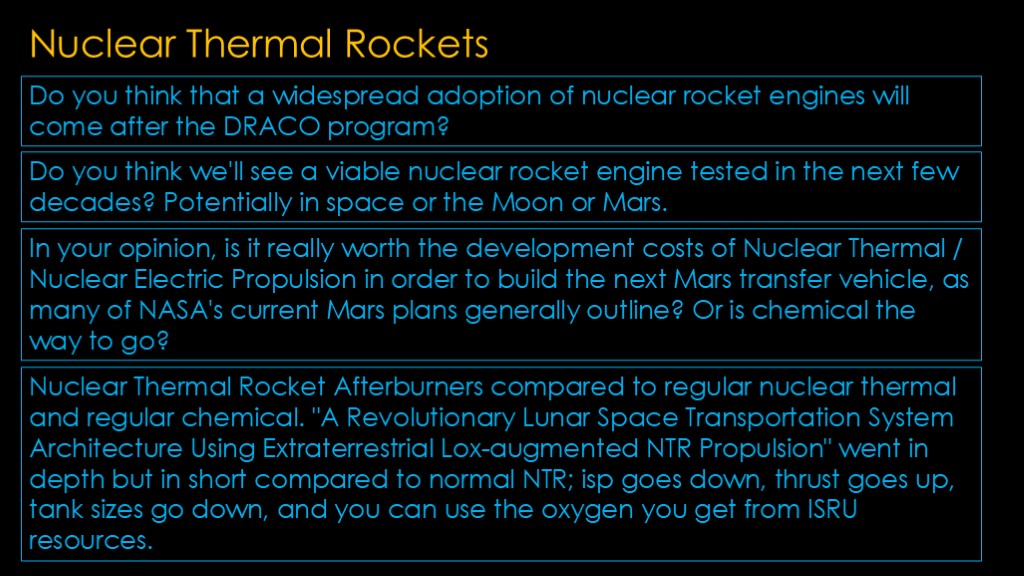
There were four really good questions about Nuclear thermal rockets.
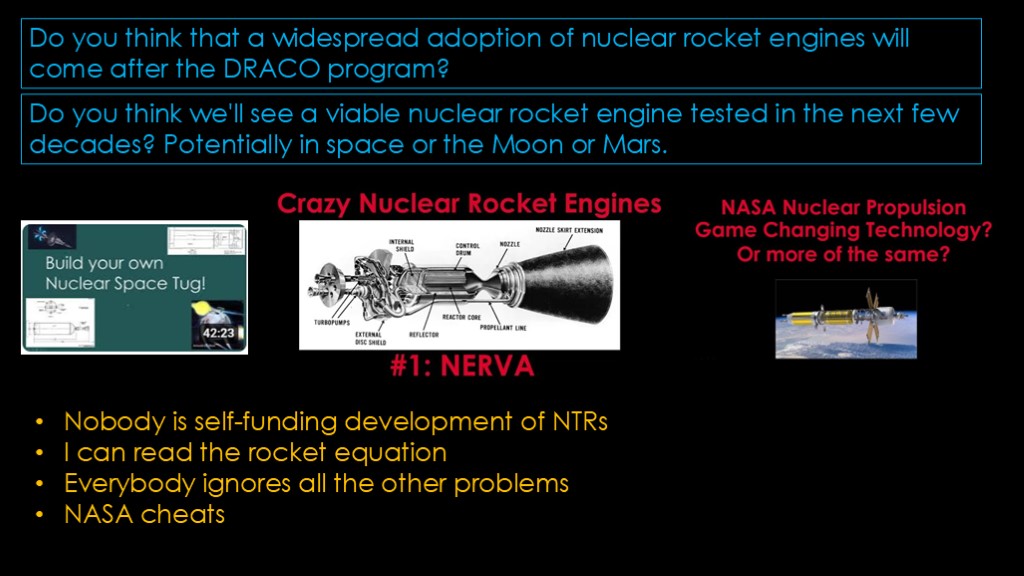
My weasely answer to these questions is that it will depend on what they actually end up building...
But that's not very satisfying, so I'll see what I can do. If you've watched some of my other videos, you already know that I call myself a skeptic when it comes to nuclear thermal rockets. If you haven't', you should go watch those now...
And I should probably enumerate why I'm skeptical...
First, AFAICT, nobody is self-funding development of NTRs, which generally means companies are more excited about the development dollars than they are about the commercial or military applications.
Second, I can read the rocket equation and do simple calculations. Pretty much universally, the nuclear rocket advocates talk about how great the specific impulse is and totally ignore the mass ratio. I complain about this a lot when it comes to hydrolox engines, but it's a lot worse with NTR because the propellant is only liquid hydrogen so the tanks are giant and the engines made out of very heavy uranium are not surprisingly very heavy.
Third, everybody ignores all the other problems. The core is hugely radioactive once you turn it on which means nobody wants to be around it, you want to run it hot to get the highest specific impulse but that means you might melt your core, and you can't actually turn it off when you want to because you have to keep running hydrogen through the core to slowly cool it off. And your engine is low thrust; you basically get RL-10 level thrust out of most designs.
Fourth, NASA cheats whenever they make mission-based proposals; they come up with these gossamer tank designs that weigh nothing but somehow are good enough to hold in liquid hydrogen and they compare it to standard designs.
The problem is that there isn't enough reality.
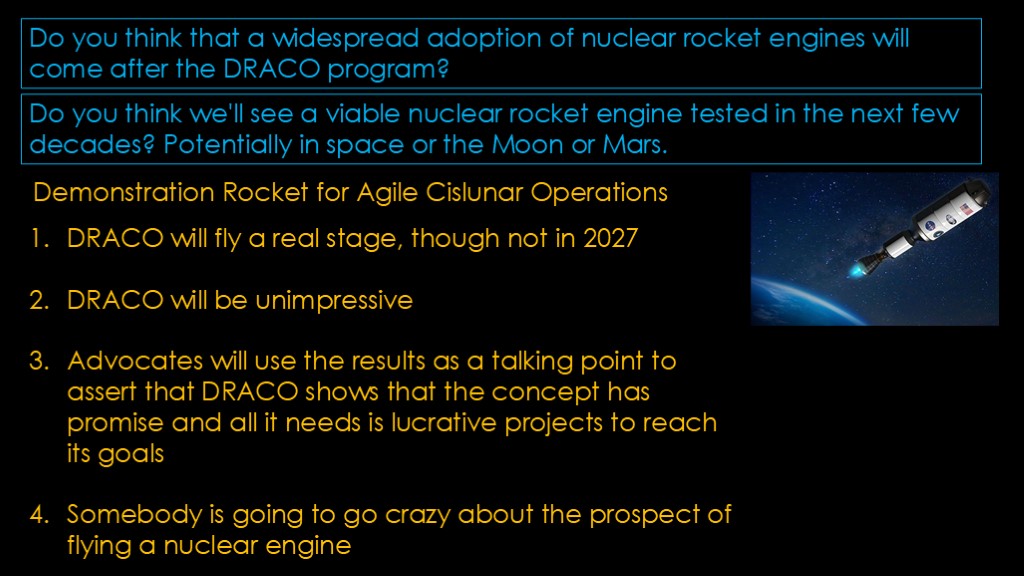
Which brings us to the DRACO program, which AFAICT is a continuation of the NASA program but is now run by DARPA, and, not surprisingly given the way NASA is running things these days, there's been no status update on the program since it was first started. I've thought of doing a freedom of information act request but my record getting useful information out of DoD is pretty poor.
I'm on record saying that I support the NASA program because I just want someone to build and fly something so we have a real stage that I can talk about rather that basing my opinion on a bunch of less trustworthy sources.
That's not a very exciting opinion, so I will make three predictions...
The first is that DRACO will fly a real stage and test it in orbit, though it won't be in 2027. I'm really going out on a limb here predicting that a space program will be late.
The second is that draco will be unimpressive; it's not going to make anybody want to use it instead of chemical engines. I'm predicting this because the parameters set in the original NASA proposal pretty much assured that the resulting engines will be boring. I'd love to be wrong here and see somebody step up with the advanced technology advocates have talked about for so long, but there are good reasons that we probably won't see that.
The third is that advocates will use the results as a talking point to assert that draco shows the concept has promise and it just needs a lot more money to reach its goals.
Add in a bonus prediction - somebody is going to go crazy about the prospect of flying a nuclear engine. There are lawsuits over simple RTGs, and this will be a full reactor.
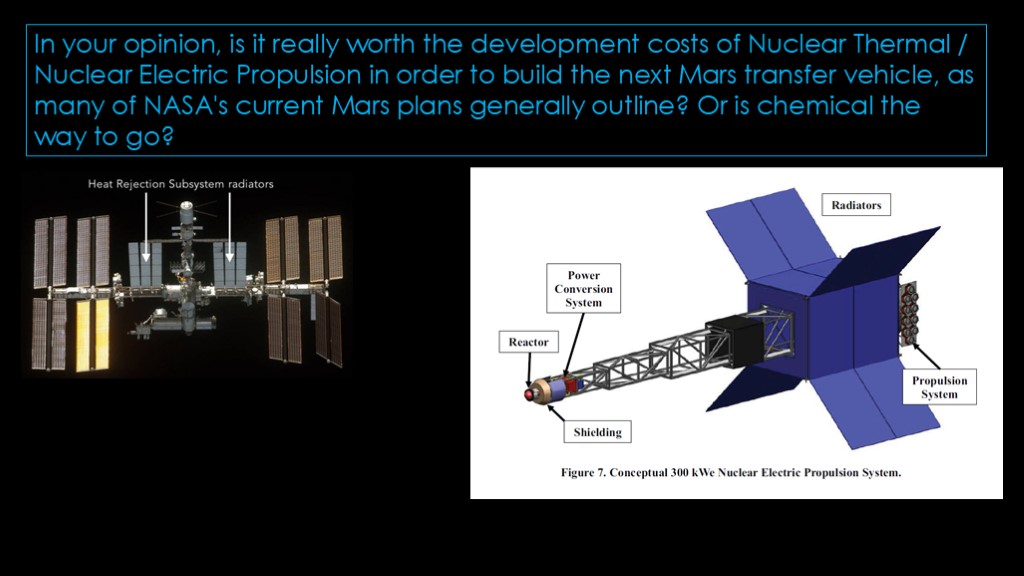
I already talked about nuclear thermal so this will be about nuclear electric. Conceptually, it's pretty nice - you use a nuclear reactor to generate a bunch of electricity and then use that to drive a system based on ion thrusters. You need a whole bunch of ion thrusters to get a useful level of thrust but that appears to be possible and they have crazy high specific impulses, which means they are very fuel efficient.
The problem is heat. We generally think of space as a very cold place, but it's really a place where the usual methods of heating and cooling do not work well - no convection or conduction, so we are just stuck with radiation. The international space station has these large radiators to get rid of waste heat.
The problem with nuclear electric is that there is a ton of waste heat. The efficiency of your radiators depends on how hot they are; if you want to use water-based radiators you are going to need a ton of them, like in this NASA design.
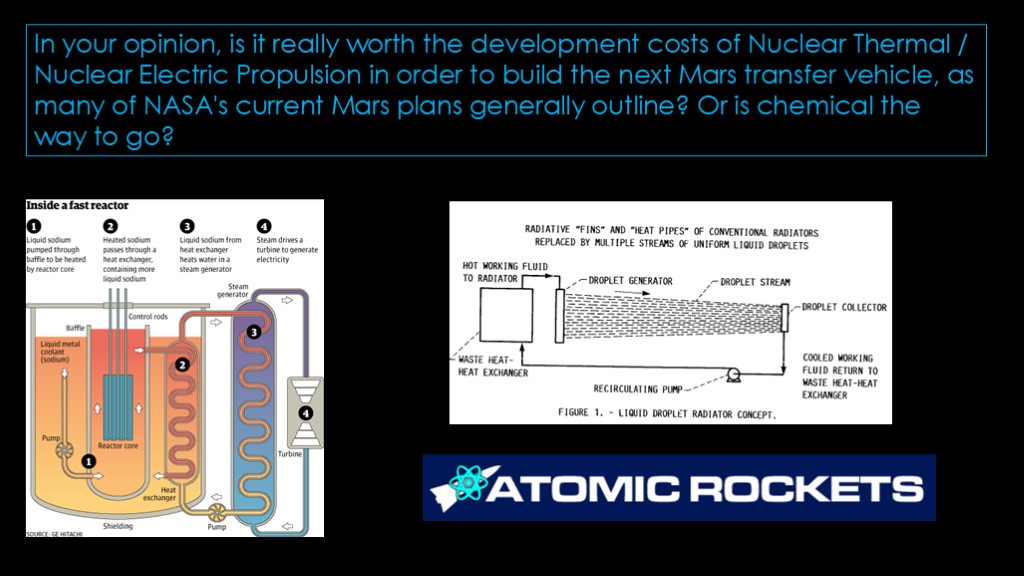
The alternative is to use a much hotter fluid, with liquid sodium being a common choice. This has been used in fast nuclear reactors, but they use a very special design.
Sodium will be much hotter and therefore give you smaller and lighter radiators, with the slight downside that if your system springs a leak in any place with air it will immediately catch fire, and if the system gets just a little too cold the sodium solidifies in the pipes.
The concepts after that get even weirder, including liquid droplet radiators where you spray the hot fluid in a stream and then collect it after it has cooled.
As usual, Winchell Chung's Atomic Rockets site has all the best information on radiators.
So my summary is that the nuclear electric heat problem seems like a really hard one to solve and for the inner solar system, solar electric might be a better choice.
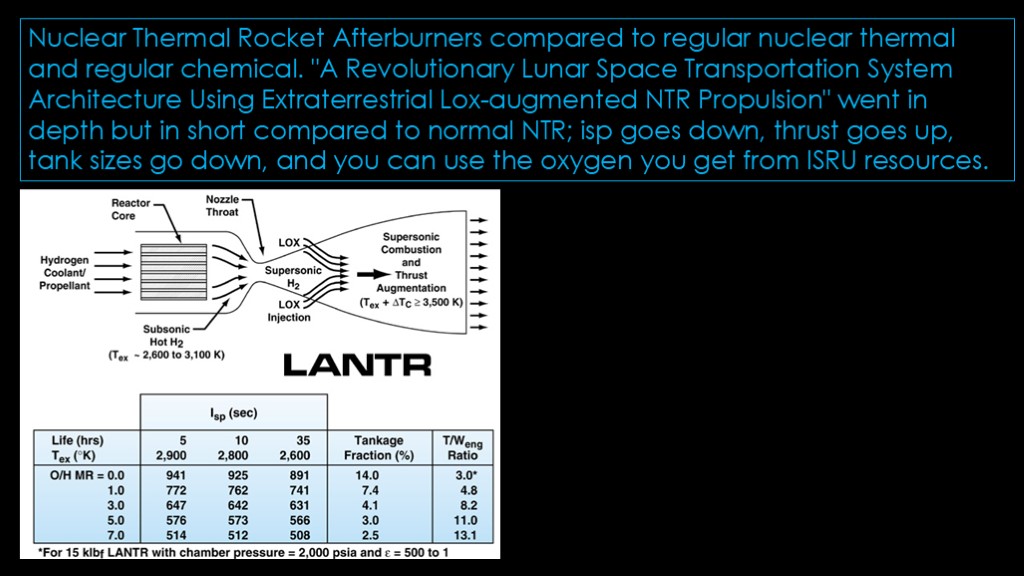
That's a fun paper from 1994. The concept is normally known as LANTR, for lox-augmented nuclear thermal rocket.
You take a normal nuclear thermal rocket, and then when you need extra thrust you inject LOX into the nozzle and it functions as an afterburner. It's a multi-mode rocket - low thrust and high specific impulse with pure hydrogen, high thrust with lower specific impulse with oxygen, or in between. The big issue I see - beyond the usual NTR disadvantages - is that with a lot of oxygen the specific impulse is down to only about 500 and you have an engine that weighs about 7 times what an RL-10 hydrolox engine weighs but gives equivalent thrust, which means you get a worse mass ratio and therefore less delta v.
I don't see much benefit over a hydrolox engine.
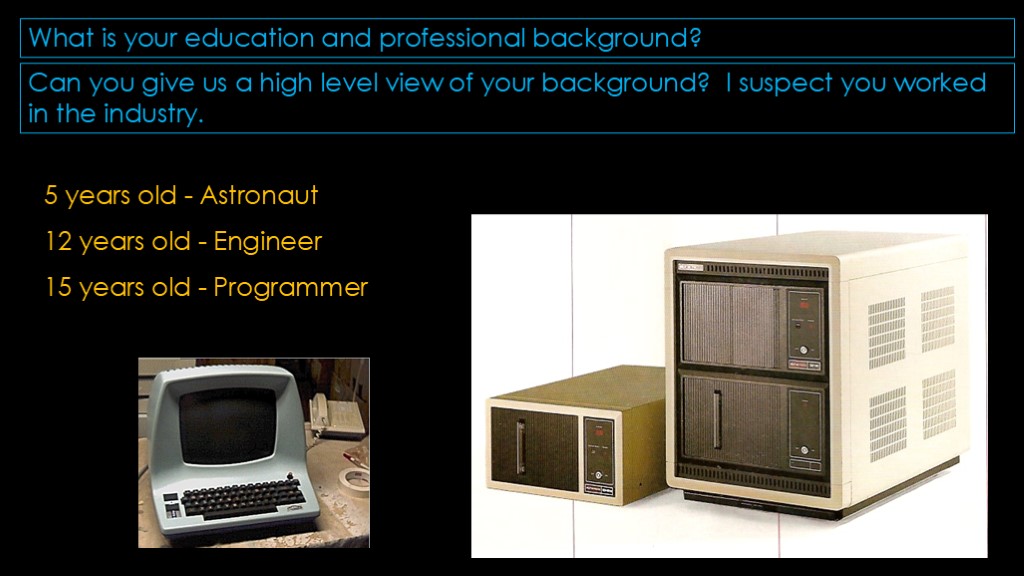
When I was 5 years old, I wanted to be an astronaut. By the time I was 12, I switched to engineer which seemed more practical, especially given my eyesight.
Then I went to a high school in 1978, and had a math teacher who was ahead of his time and got exposed to an Alpha Microsystems computer with ADM3A terminals, and the die was cast.
Programming was both easy and fun and it was pretty clear that I was going to make it a career. I have a BS in computer science with minors in math and business. I worked at a number of places during my career, including a long stint at a "major redmond software company".
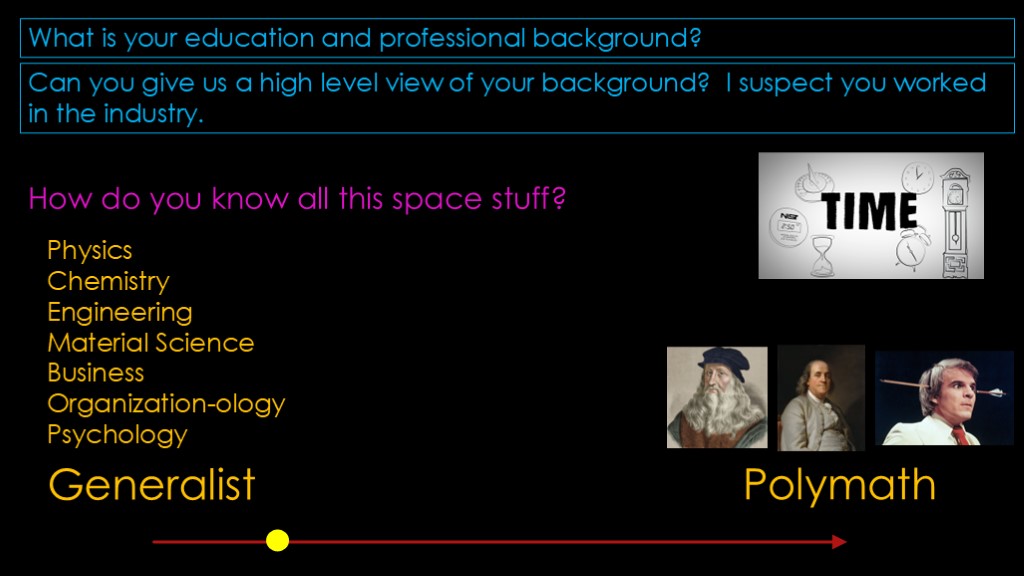
So the obvious question is, "How do you know all this space stuff?"
The first explanation is simply time. If you are interested in a topic and you study it for 4 decades, you tend to accumulate a lot of useful information. Or at least I do.
The second explanation is that I'm a generalist. I do have in-depth knowledge in some areas, but I have a decent level of knowledge in a bunch of areas. For this channel, I know a fair bit of physics, chemistry, engineering, material science, business, organization-ology (not sure what to call that), and psychology.
That gives me the ability to see connections, which is good. It also means I run out of depth in a lot of areas - I know a little about rocket engine design but nothing compared to the people who do it for a living.
There's another old word that kindof applies, and that's polymath, in the sense that I have wide ranging interests and know a lot about a bunch of topics. Like I know what a polymath is....
If we look at the polymath scale, I'm down here, a long way from the greats like DaVinci, Franklin, and Martin.

(read)
There can only be one choice. I think it's both the safest and the coolest.
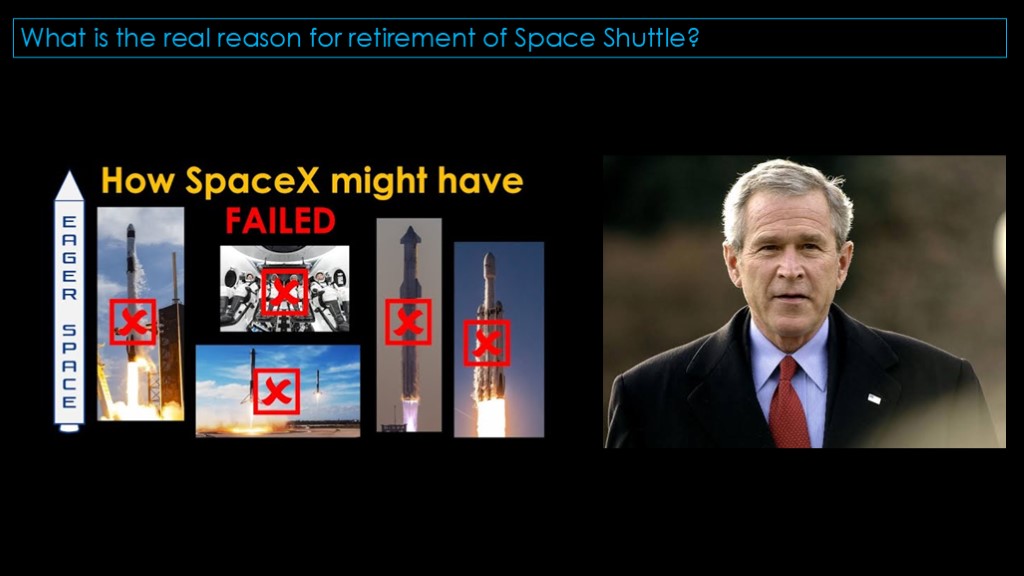
If you watch my video about how spacex might have failed, I talk about it there.
The short answer is that President George W. Bush wanted a legacy and he chose "a really cool space program", and that required cancelling shuttle because there wasn't enough money to do shuttle, the space station, and the big exploration program.
Turns out there wasn't enough money after shuttle was cancelled, but that's another story.

It was funky and different and probably the worst thing I did in terms of getting subscribers to the channel.
But take a look at the end of this video and tell me if you think it works as an outro...
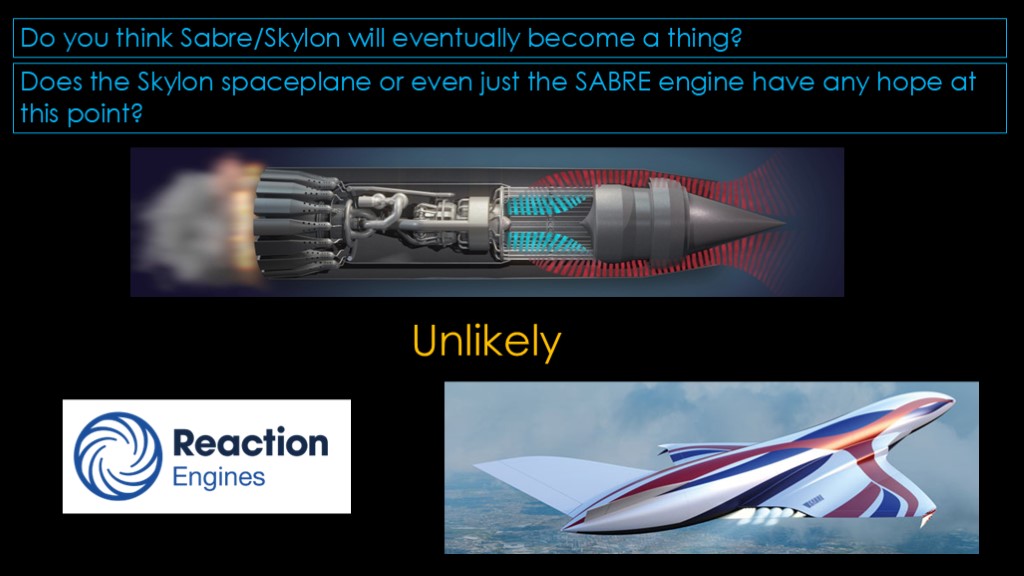
Unlikely.
SABRE is a concept for a hybrid mode rocket engine where you take in outside air, cool it down a bunch using a heat exchanger, and then that cooled air is injected into the rocket engine and burned with liquid hydrogen.
The concept has been around in various forms since the 1950s.
The reason I think it's unlikely is that a) they were initially talking about a single stage to orbit vehicle and that made very little sense and b) nobody really wants to put money into it. That second one is usually a good indication of problems with a concept as companies have to disclose a lot of information to get funding.
Note that the opposite is not true - people putting money into a project is not a sign that it's a good bet.
I've also found it strange that reaction engines was targeting sabre towards single stage to orbit when that is so obviously a really, really hard thing to do.
It would make more sense to target it towards hypersonic flight where the constraints are easier and you may garner interest and money from the military.
If you go to the reaction engine website you can find information about SABRE if you dig deeply enough, but their tagline is now "thermal management for a cooler, cleaner world".
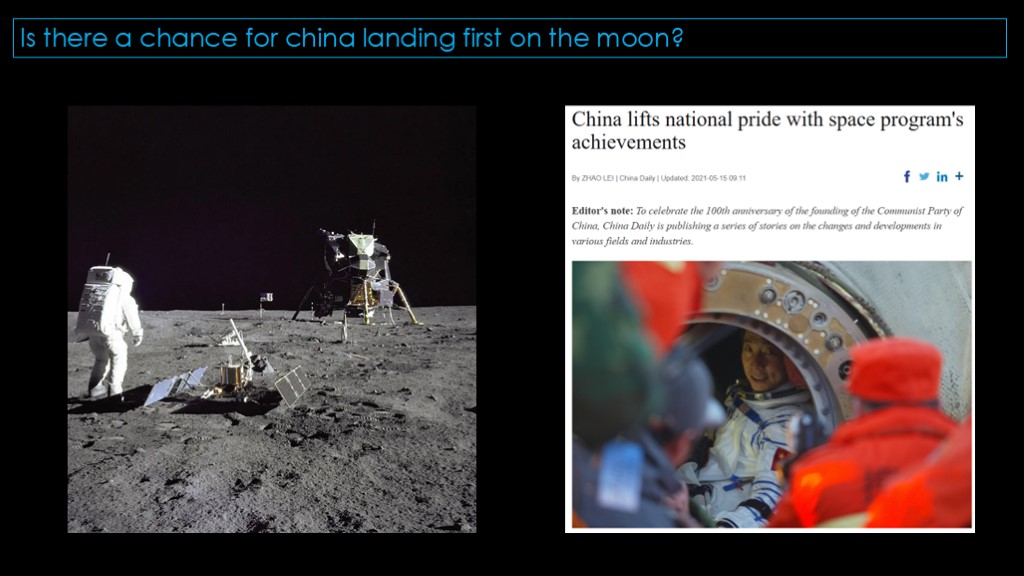
Probably not.
But if you are asking whether the Chinese will beat Artemis to the moon, I think it's pretty likely. One of the reasons that Apollo succeeded was that the program was deeply tied to American pride. The Chinese are very proud of their space program and have - from what I can tell - a decent moon program.
Artemis is this weird program that came about because congress told NASA to build a big rocket and work on a capsule and ended up spending $45 billion on it and it seemed like going back to the moon was something you could do with it. That's why we're in this weird situation where Orion can get to lunar orbit but there's no NASA-developed lander and the architecture to use starship and Blue Moon is so weird.
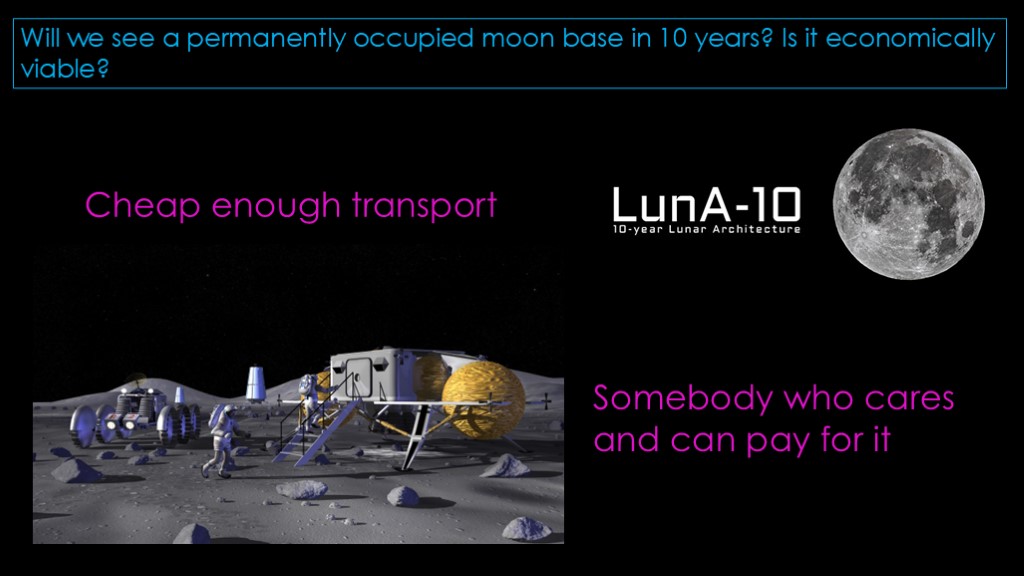
NASA of course has wanted this for years, and DARPA is working on their LunA-10 architecture.
For anything like this to happen, we need a combination of two things.
The first is cheap enough transport for people and cargo to the lunar surface. I'm not sure what cheap enough actually means, but starship might get you there, and the Blue Origin mark II lander might get you there.
The second requirement is for there to be somebody who cares and can pay for it. And that somebody pretty much has to be congress - NASA cares but they don't control their budget and DoD cares but they would also need congressional approval.
I'm kindof thinking the answer is "no", but it's going to depend on how congress reacts to China getting there and how cheap transport ends up.
As for economy, there's lots of talk about a cis-lunar economy but nobody has a real application where it would make sense, and by that I mean a market that somebody will actually pay money for.
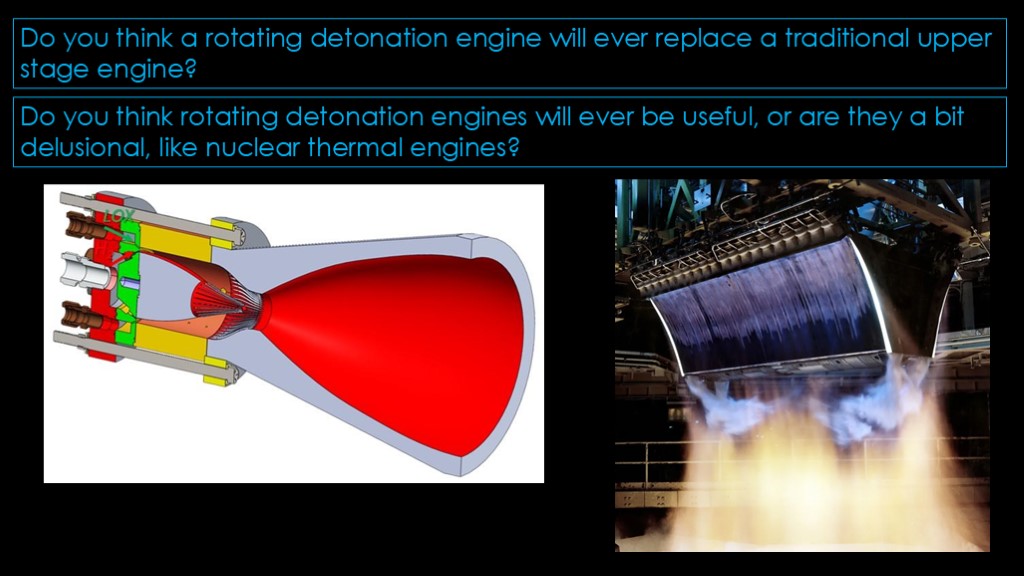
Rotating detonation engines have been getting a lot of hype. A video on them is on my list but I'm only interested if I can answer these questions and I don't think there's enough data yet.
Is it a real innovation, or is it another aerospike? I don't know.
I tend towards skepticism, but I could be wrong.
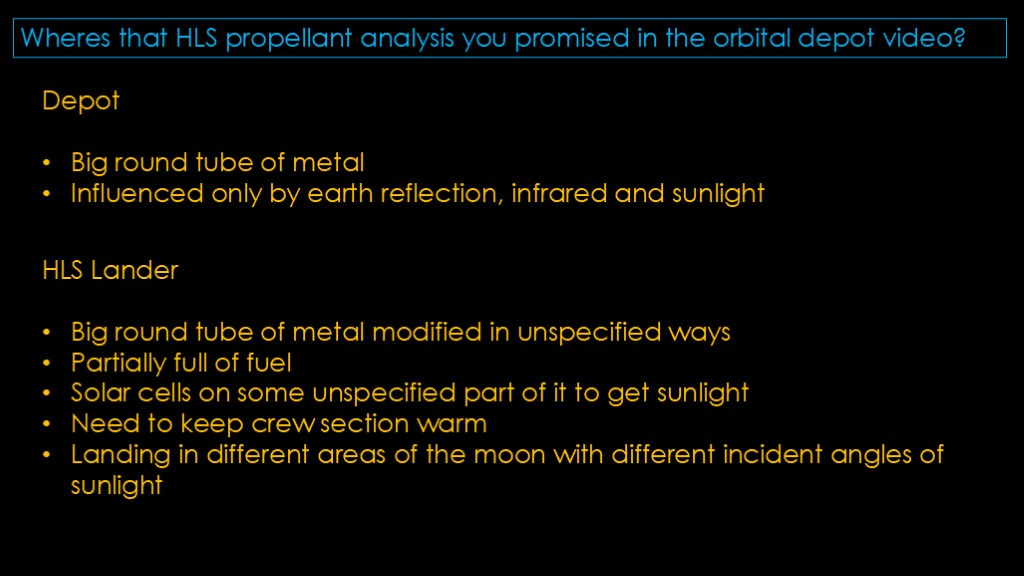
I suspect the answer you are looking for is "in the works", and I'm afraid I'm going to have to disappoint you.
When I released the propellent depot video, I was already at work on two other videos and those took priority for a few weeks. Then when I came back to look at an HLS video, I ran into some immediate issues.
The depot analysis was pretty simple to do and I could come up with reasonable approximations. It's a big round tube of metal and the factors are reflected sunlight, infrared from the earth, and direct sunlight.
The HLS lander is a lot different
(read)
One problem at the time was we had one render of what the lander would look like without much detail and SpaceX was - and still is - quite tight-lipped around what the lander will actually look like.
The second problem is the last one listed. The lander will get heated by the sun, presumably coming roughly from the side because it's landing near the south pole, and it will be heated by sunlight reflected from the moon's surface and also by infrared coming off the surface. There were things there that I don't know how to model, that differ depending on where the landing site is and when the landing occurs, and I suspected that the things I didn't know would have a big impact on the result.
So, at the time I decided I wasn't really up to it. And in the last month or so, I had a discussion with somebody who knows more than I do and based on the approach they said they would take, I'm more sure that I'm not up to it.
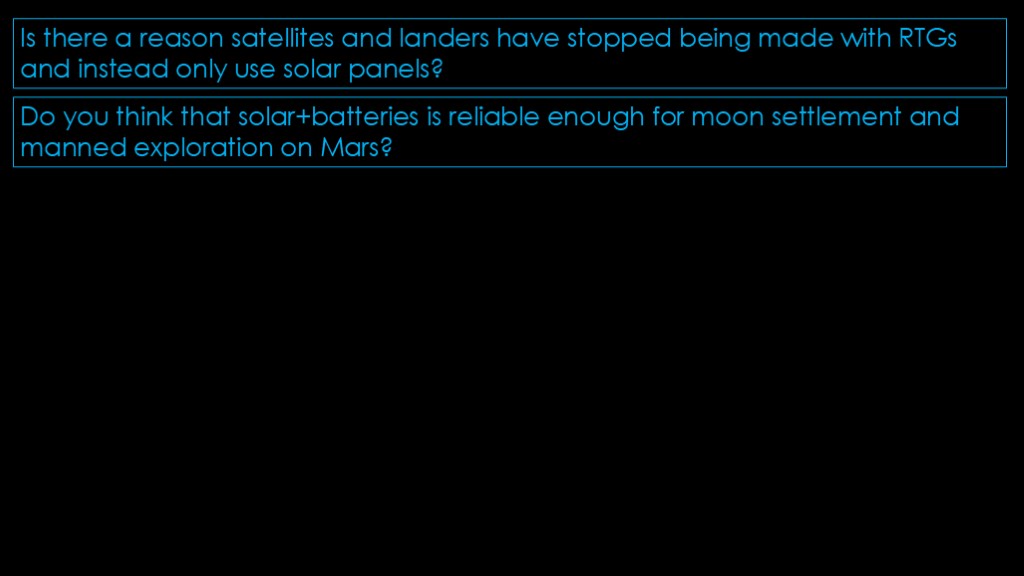
This was a single comment but there are two distinct questions.
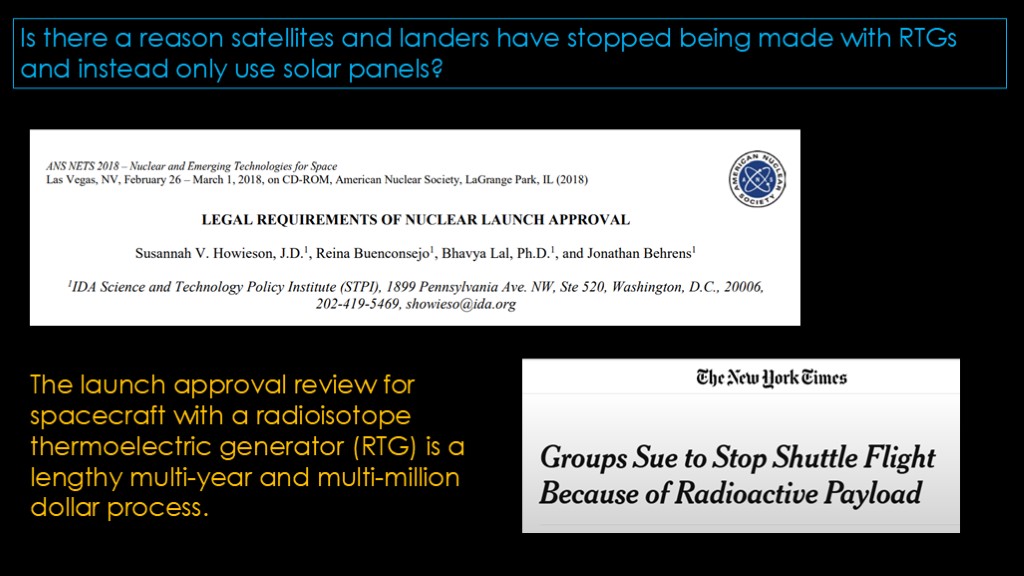
(read question)
RTG means radioisotope thermoelectric generator, a way of using the heat from decaying radioactive materials to make electricity.
There are two big factors. The first is that RTGs are a big pain in the butt to deal with from a legal standpoint. This paper says the following:
(read)
Even after that process, you will very likely get sued and have to deal with that.
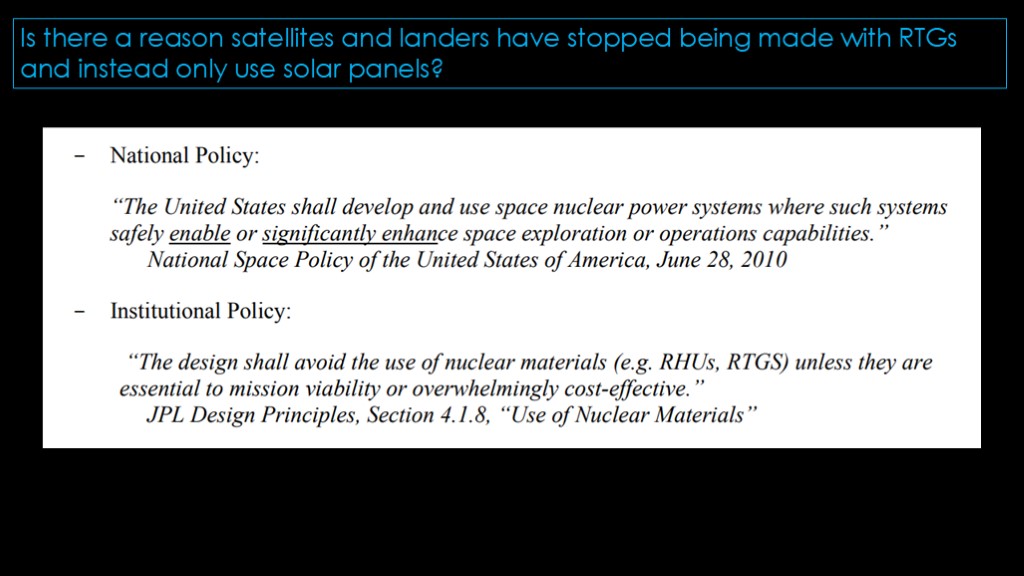
There is also both national and institutional policy that says that radioactive solutions can only be used when they are a big win.
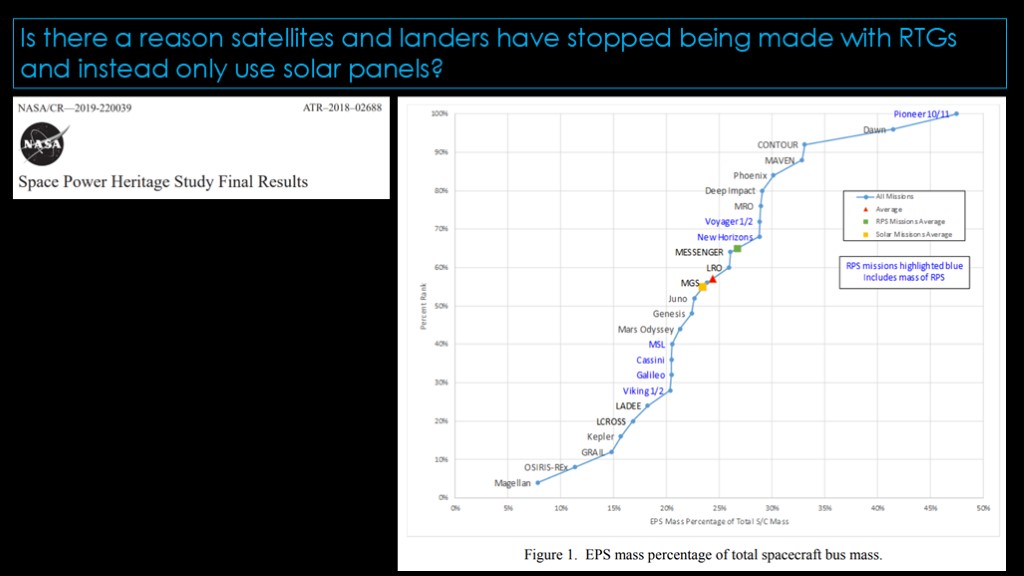
NASA of course has a study from 2019 that compares missions that used radioactive or solar power sources.
This graph shows the mass of the electrical power system compared to the mass of the whole spacecraft bus (masses are compared without payload mass). The nuclear (RPS) missions are coded in blue. I mostly expected the solar ones to be heavier because solar panels are heavy, but the radioactive elements used are very heavy and they tend to have heavier spacecraft busses.
That probably has an effect on launch cost or the mass of the payload.
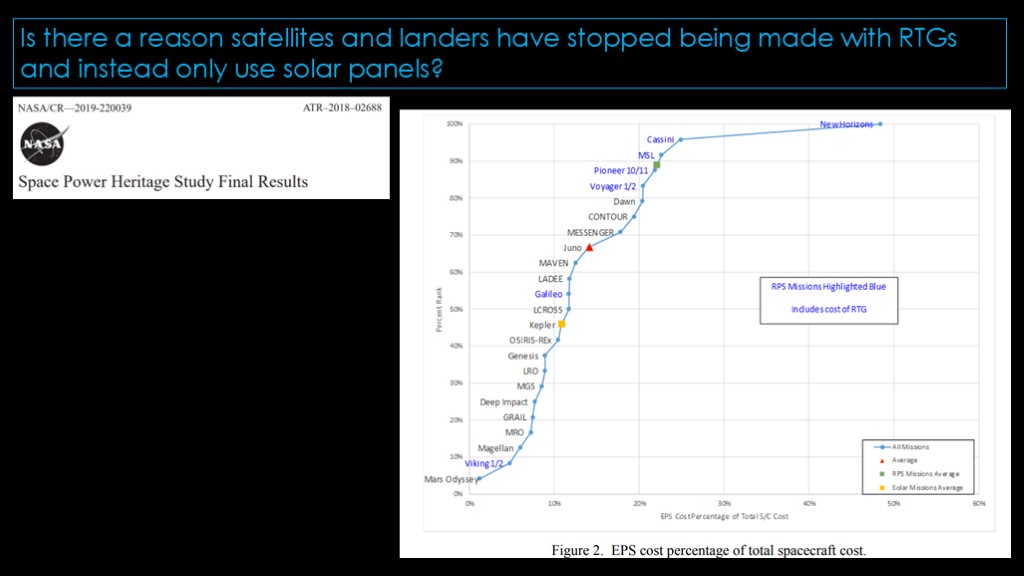
This second graph looks at the cost of the electrical power system, and it turns out the nuclear systems are considerably more pricey. Or, to put it another way, you spend more of your money on power than if you used solar.
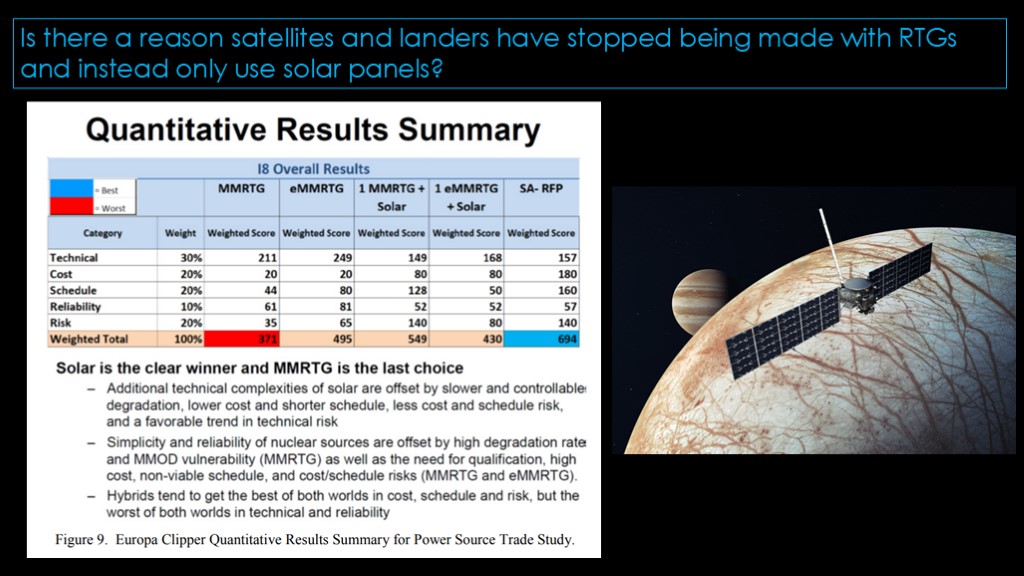
Solar is a pretty obvious choice for inner solar system missions, but I was surprised to find this result from the Europa clipper mission all the way out to Jupiter, where solar won pretty resoundingly.
I do expect that missions to Saturn and beyond will still rely on radioactive power sources because the sun is so dim at those distances.
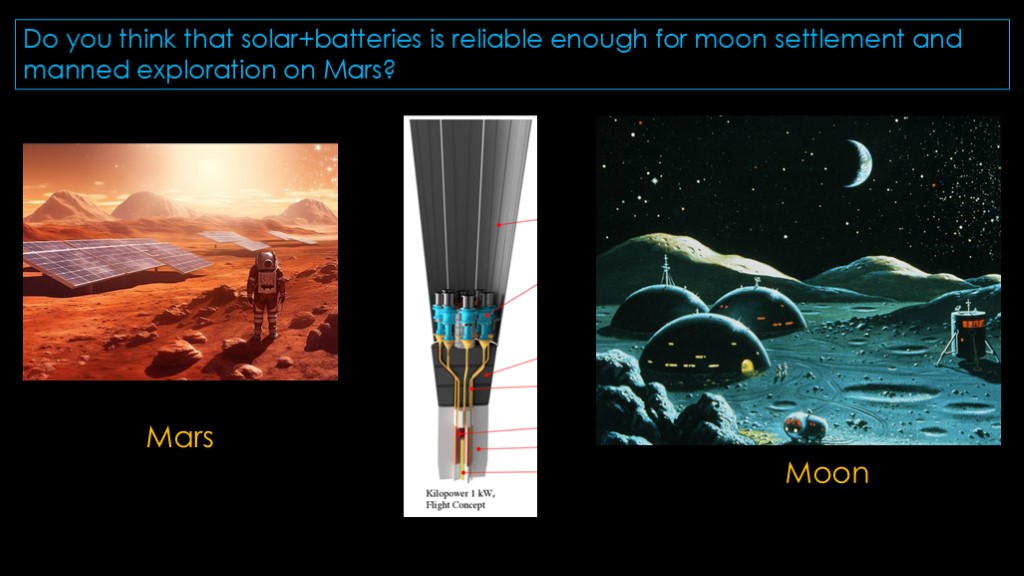
For Mars you can get away with solar panels and batteries. The lunar night is 14 days long, so you will need a lot of batteries to make solar work.
In either case, I think you'll be a lot happier if you have a few kilopower reactors to give you a constant power source.
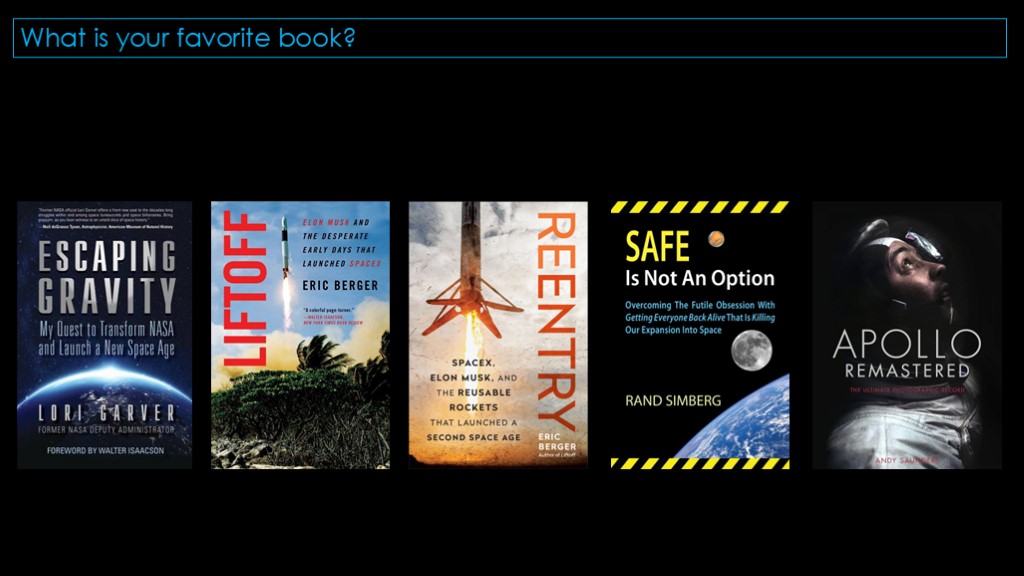
I read a lot, so this is a really hard question to answer.
In the non-fiction space realm, I recommend
Escaping Gravity by Lori Garver, which is a great look inside NASA during commercial crew
Liftoff by Eric Berger, which looks at SpaceX during the Falcon 1 era
I'm going to "pre-recommend" reentry, which is Eric Berger's book about Falcon 9, scheduled to release in September of 2024.
Everybody should read Rand Simberg's "safe is not an option". It's very insightful and the kindle version is only $5.
And finally, Apollo Remastered is just a stunningly great photography book about Apollo. If you've ever wondered what a talented photographer could do with the Apollo originals, this is the book for you. It's not cheap but you really want the hardback.
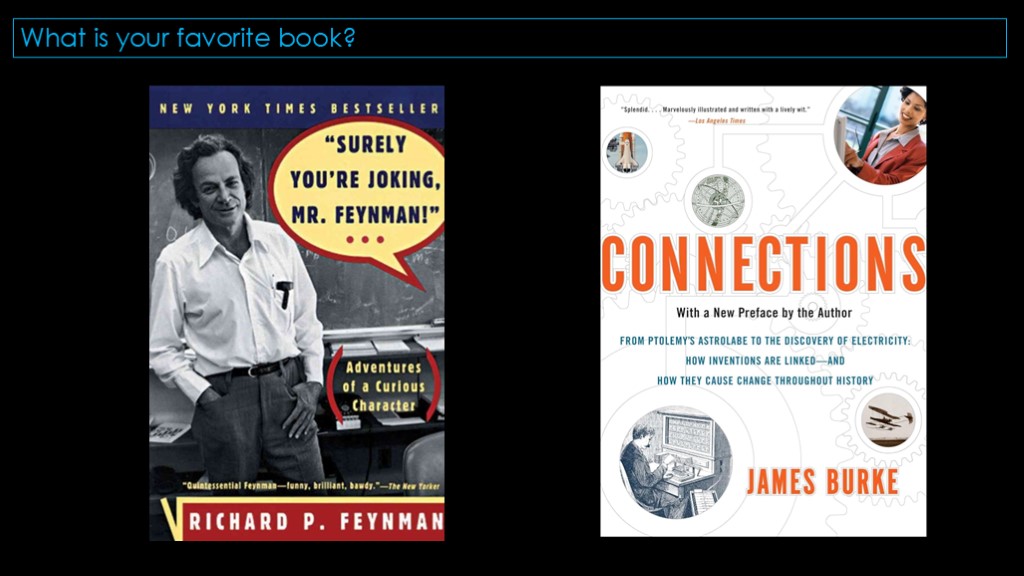
I'll also recommend the classic "surely you're joking, Mr. Feynman" and the sequel is pretty good.
James Burke's Connections is also a classic, along with "the day the universe changed".

For science fiction, I have three series that I think you might like.
Trading in Danger by Elizabeth Moon, Valor's choice by Tanya Huff, and Live Free or Die by John Ringo

But that didn't really answer the question...
My favorite book is pride and prejudice by Jane Austen
If you prefer to watch a video, by far the best version is the 1995 BBC miniseries starring Colin Firth and Jennifer Ehle (ee-lee).
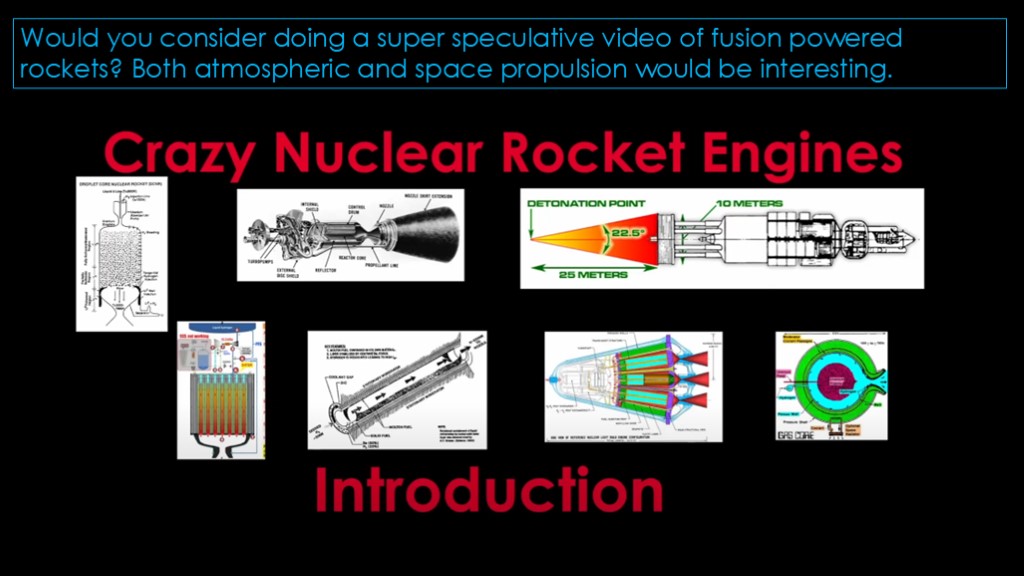
I might.
I've heard that this playlist is okay...
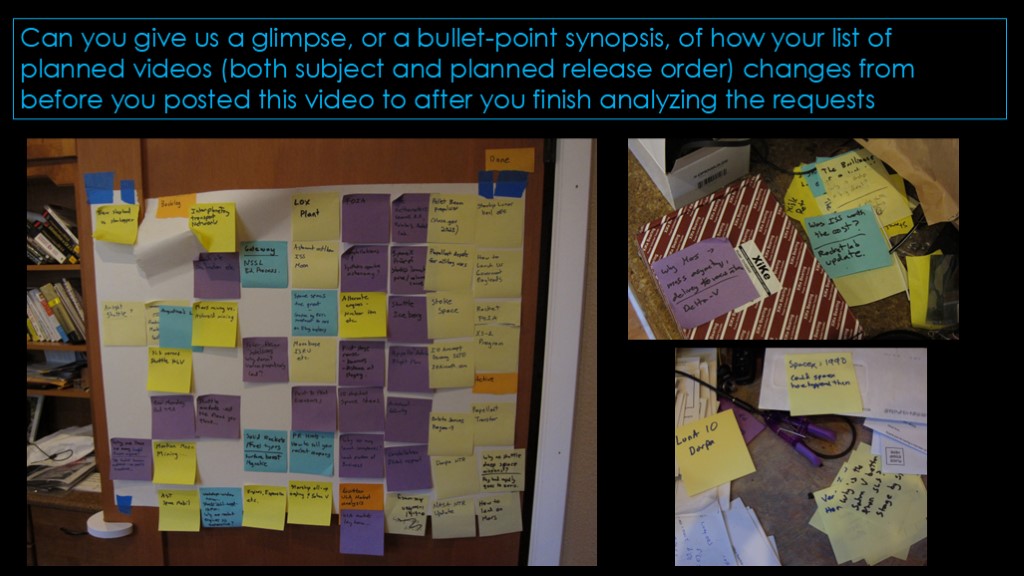
Happy to share my process which I think should make the answer clear.
This is my main topic board. I haven't looked at that for a while, and there a few that no longer should be there.
The tear in the paper is because of my cats jumping onto the top of the door and then tearing things when they slide off.
That leads to the overflow of topics on my workbench, which are post-its that my cats knocked down or fell off on their own.
And then, finally, what is closest to my current backlog is another set of post-its on top of my desk, though the main pile was actually hiding under some envelopes.
The SpaceX 1990 and LunA 10 Darpa topics are new ones that came out of the viewer questions. The droneship landing video came out of the questions as well and there are a couple more questions that might make their way to a separate video. I'm not sure yet.
I'm generally working on one video, with maybe a second one in introductory stages when I get tired of the first one. Sometimes I'll reach a point where a video just isn't working, so I'll put it to the side and maybe pick it up later.
While I'm finishing this one I'm working on a new one about the future of NASA and working on another one based on questions.
That's a short way of saying that my process is very ad-hoc and therefore I can't answer the question.
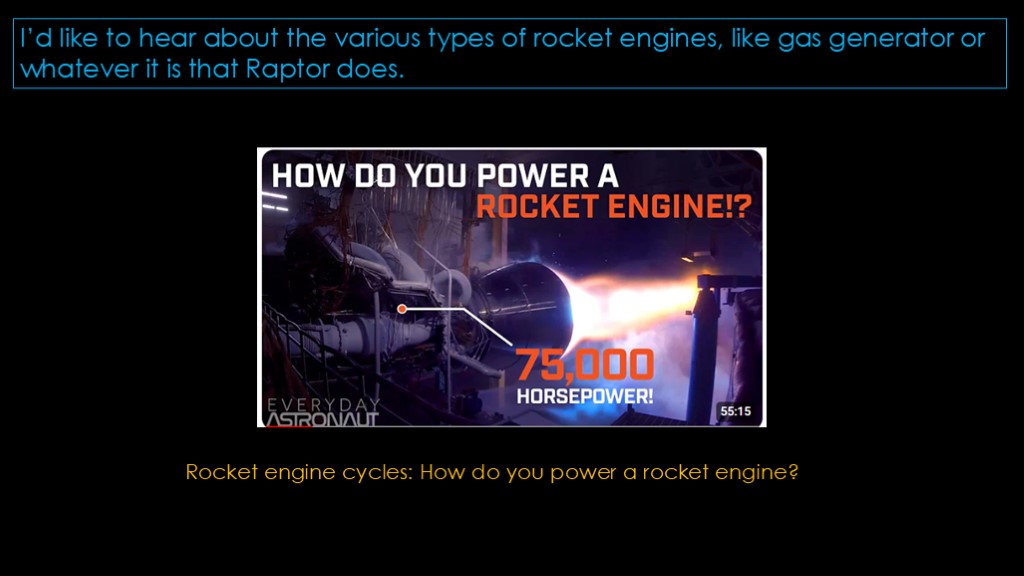
No way can I equal Tim Dodd's video "Rocket engine cycles: how do you power a rocket engine?"
Go watch that.
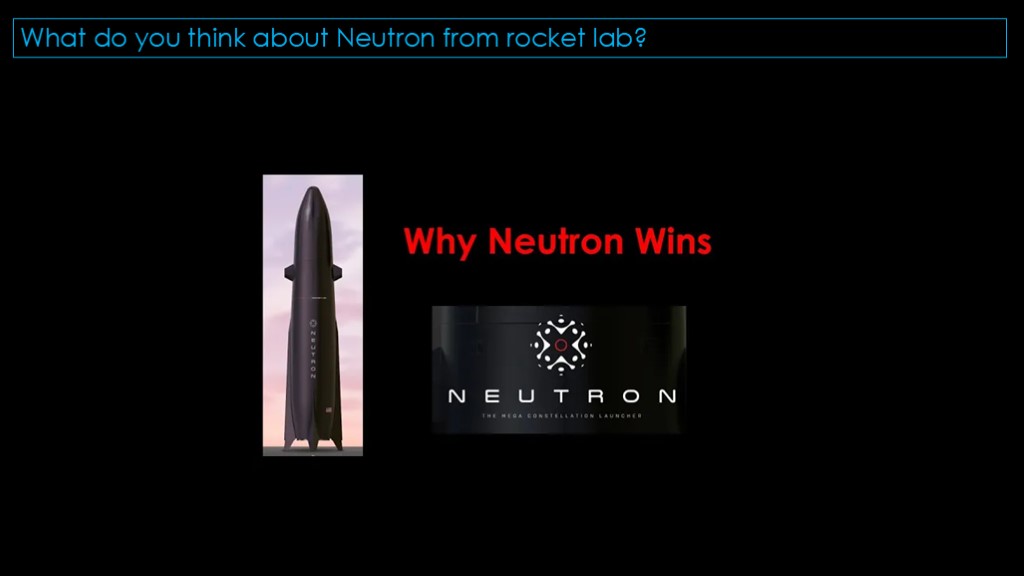
This video is a little dated but I mostly still agree with what I said here...
I have been thinking of contrasting the reuse approaches of Falcon 9, Neutron, and Starship, and that might show up in a video.

Are we done with the questions?
Yes, yes we are.

If you enjoyed this video, I could do with a cold beverage.
I can't drink the real stuff very often because I'm kindof allergic to alcohol, but this is a decent substitute IMO.